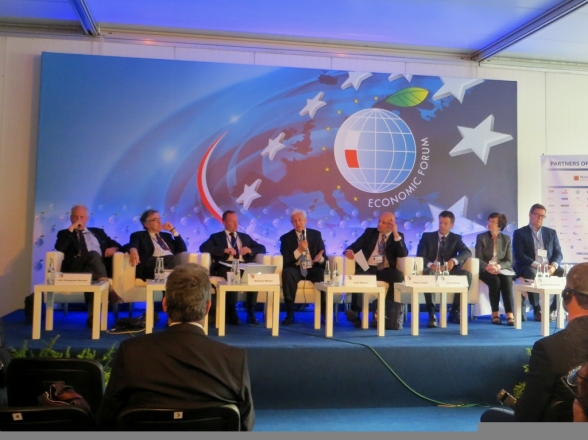Today in Krynica-Zdrój, the 25th Economic Forum was opened, a multidisciplinary platform for sharing opinions from the fields of politics, economics, international relations, security, energy, health, and innovation. Chairperson of the Committee on European Integration Mr Slaven Radunović is participating in the Forum.
The Forum was opened with a plenary session on the topic “Towards a Resilient Europe. Strategies for the Future”, with the following speakers: Mr Andrzej Duda, President of the Republic of Poland; Mr Gjorge Ivanov, President of the Republic of Macedonia; and Ms Kolinda Grabar-Kitarović, President of the Republic of Croatia, while the moderator was Mr Zygmunt Berdychowski, the President of the Programme Council of the Economic Forum.
The Polish President pointed out in his address that Europe was currently facing a series of challenges, the most significant being the Eurozone crisis, war and political instability in Ukraine, as well as unfavourable demographic trend and fall of competitiveness of the European economy. In that respect, the EU should work on strengthening the unity between the member states, promoting internal and external security, but also on the institutions of the Union itself and its founding principles. Mr Duda pointed out that the EU’s greatest potential was in the enlargement policy, meaning continuation of negotiations with the candidate countries and potential candidates.
President of Macedonia said that, in the Western Balkans countries, the EU was perceived as an actor which would contribute to strong transformation of the countries in the region, which was demonstrated through contribution of the Union to building good neighbourly relations. He added that the membership to the Union did not represent a goal in itself, but that negotiations were a process through which the Western Balkans countries would be brought closer to the European standards. In the context of the refugee crisis, Mr Ivanov said that Europe should deal with the causes of instability in the Middle East, and not only its effects.
The Croatian President expressed her position that the current crisis of identity, vision, and leadership in the EU should be met with decisive action and finding solutions, in accordance with the inherent EU ideals. She added that the Union should strengthen its position on the global stage, enhance competitiveness, and become a centre of economic development, and also strengthen the Eurozone instead of letting the common currency become its weak spot. Furthermore, strengthening the cooperation between the countries of the Baltic sea and the Adriatic sea would strengthen the Union itself, she concluded.
In continuation of the working day, within the topic “Business and Management”, a panel discussion was held on the topic “Euro in Europe, how is the common currency viewed today?”. Multiple panellists expressed the view that the common currency was especially significant for the growth of Europe’s competitiveness, but there were also ideas voiced on the need for creation of the banking union, which implied setting clear rules and risk sharing. The panellists from Latvia and Lithuania talked about the experiences of the two latest members of the Eurozone, and they also discussed the Greek crisis, in the context of building trust between the state and its creditors. They also expressed the view that an orderly exiting of a country from the Eurozone was possible, with cooperation of all the actors involved.
The Forum is organised by the Institute for East Studies, and it gathers more than 3000 participants from Europe, Asia, and the United States of America.









